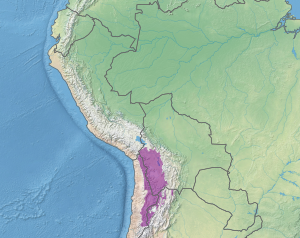Central Andean dry puna
| Central Andean dry puna (NT1001) | |
|---|---|

Laguna Verde, Bolivia
|
|

Location in central South America
|
|
| Ecology | |
| Realm | Neotropic |
| Biome | Montane grasslands and shrublands |
| Borders | |
| Geography | |
| Area | 307,430 km2 (118,700 sq mi) |
| Countries | Argentina, Bolivia, Chile |
| Rivers | Desaguadero River, Lauca River, Río Grande de Lipez, |
| Conservation | |
| Conservation status | Relatively Stable/Intact |
The Central Andean dry puna (NT1001) is an ecoregion in the Montane grasslands and shrublands biome, located in the Andean high plateau, in South America. It is a part of the Puna grassland.
This ecoregion occupies the southwestern portion of the Altiplano and is located east of the Atacama Desert.
Salt flats, locally known as Salares, are a characteristic feature of this ecoregion. Among the largest salares are Coipasa, Uyuni, Atacama, and Arizaro. Other major geographical features are the lakes Poopó and Coipasa, and the many volcanoes that tower over the altiplano, including Parinacota, Nevado Sajama, Tata Sabaya, Ollagüe, Licancabur, Lascar, Aracar, Socompa and Llullaillaco. In addition, numerous and colorful small lakes and ponds dot this region. There are seasonal as well as permanent, and have different degrees of salinity.
This ecoregion has a cold desert climate.
Typical high Andean wetlands are the Bofedales. These marshy areas are characterized by the presence of cushion bog vegetation. The Yareta grows in well-drained soils. Grasslands are dominated by species of the genera Stipa and Festuca.
...
Wikipedia
